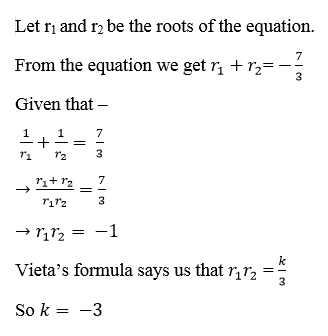An algebra problem by odyson santos
If the sum of the reciprocals of the roots of the quadratic
3 x 2 + 7 x + k = 0
is 3 7 , what is k ?
The answer is -3.
This section requires Javascript.
You are seeing this because something didn't load right. We suggest you, (a) try
refreshing the page, (b) enabling javascript if it is disabled on your browser and,
finally, (c)
loading the
non-javascript version of this page
. We're sorry about the hassle.
6 solutions
a=3,b=7,c=k
S u m o f r o o t s = a − b = 3 − 7
P r o d u c t o f r o o t s = a c = 3 k
Let the roots of the equations be α and β
Sum of reciprocal of the roots of the equations
= α 1 + β 1
= α β α + β
= 3 − 7 / 3 k
= 3 − 7 × ( k 3 )
3 − 7 × k 3 = 3 7
9 k − 6 3 = 9 k 2 1 k
− 6 3 = 2 1 k
k = − 3
3 (1/ y)^2 + 7 (1/ y) + k = 0
k y^2 + 7 y + 3 = 0
y^2 + (7/ k) y + 3/ k = 0
Sum of reciprocal = -7/ k = 7/ 3
k = -3
We can check by substitution that 3 x^2 + 7 x - 3 = 0 do give a sum of reciprocal equals to 7/ 3.
1/a +1/b =7/3 Thus , (a+b)/ab =7/3 but we know that a+b =-7/3 Therefore we conclude that ab=-1 Solving for k k/3 =-1 ( Product of roots criterion) k=-3
By Vieta's theorem: k = -ab but 1/a + 1/b = 7/3 since ab = -3 thus k = -3

let x 1 and x 2 be the roots of the quadratic equation a x 2 + b x + c = 0 . By Vieta's Formula , the sum of the roots is x 1 + x 2 = − a b and the product of the roots is x 1 ( x 2 ) = a c . But the given in the problem is the sum of the reciprocals of the roots, the sum of the reciprocals of the roots is
x 1 1 + x 2 1 = x 1 ( x 2 ) x 1 + x 2 = p r o d u c t o f t h e r o o t s s u m o f t h e r o o t s
The sum of the roots is x 1 + x 2 = − 3 7 while the product of the roots is x 1 ( x 2 ) = 3 k
Substituting, we have
3 7 = 3 k − 3 7 = − 3 7 ( k 3 ) ⟹ 3 7 = − k 7 ⟹ 3 1 = k 1 ⟹ k = − 3